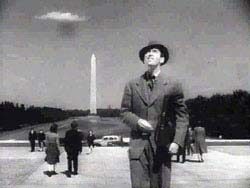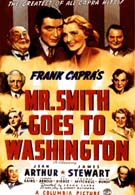Frank Capra was sometimes decried as a maker of simplistic, patriotic movies that peddled “all-American values”. Seeing as he was a Sicilian immigrant, and a genuine rags-to-riches story, it would seem wise to think otherwise: his creed wasn’t about banal lip service. The main character in this movie, Jefferson Smith, was also the real deal. And so was Jimmy Stewart, who portrayed him.
The story is simple: A U.S. senator dies, and a replacement has to be found. But the rivalry between the camps that support the two possible candidates is so fierce that the governor fears for his political future, since picking either one would automatically alienate a large number of voters.
Into this mess comes the Boy Scout (or Boy Rangers, as they for some reason are called in the movie) leader Jefferson Smith. The governor’s young son is a great fan of Smith, and insists he’d make a great senator. As the crisis escalates, the governor becomes increasingly worried, to the extent that he rather desperately decides to consider his son’s advice. To his great surprise, after a quick investigation, Smith is discovered to be the perfect candidate: naïve, devoid of greed and political ambitious, and a good, patriotic American. By this time, we learn that the true source of power is not the governor himself, but the newspaper and industry magnate “Boss” Jim Taylor, who runs not just the politics of the state, but pretty much everything else. The important thing is that whoever is appointed, mustn’t rock the boat. The governor and his men instructs the now senior senator Paine to take the young Mr. Smith under his wings, keep him out of trouble, and help him decide how to vote.
Smith is daunted, and has no desire to become a politician, but seeing that Paine was once a close friend of his father, he trusts his advice. Also, seeing Washington DC sounds like a dream to him, and viewing the mission as a patriotic duty, he agrees.
His arrival in DC, and encounters with big time politics, the big city, and the press leaves him with some bruises, but he goes along as best he can. He is both awed and inspired, but also intimidated by the monuments, the history and the trappings of power. His colleagues are kind to him, excusing him when he makes procedural errors, and Paine helps him with friendly advice.
Having no genuine duties to perform, Smith soon grows bored. Eventually, he voices his frustration to Paine, who grudgingly advises him to try passing a bill through the senate -- purely as a learning experience. The bill he creates is for the benefit of the boy-scouts; a subject close to Smith’s heart and mind. By Paine’s standards, it is an insignificant and meaningless bill. It has no hope of making it through, since Smith has no experience, contacts, or favors to call in, but it will keep him occupied.
Then disaster strikes. It is discovered that Smith’s silly little bill risks exposing a huge pork barrel project that is part of a major bill Paine has been working on for a long time. Smith is politely asked, and then ordered to drop the bill, but not understanding why, refuses, demanding an explanation. To the horror of Boss Taylor and his crew, Smith turns out not merely to be naïve, but also an idealist -- and his lack of political ambition and greed becomes a nightmare, not a boon: this maniac will not compromise. Suddenly, Smith’s procedural errors are no longer excused, and the senior senator and his former benefactor makes use of his political expertise to sandbag and out-maneuver him. Smith is vilified, slandered and betrayed, but he refuses to back down.
Your Daily Blend of Entertainment News
On the surface, the plot may have the appearance of a simple fight between good and evil characters, and that Paine betrayed Smith up front, abusing his friendship with his father to con the young man into accepting the position. This is not true. During the conflict, senator Paine tells his young colleague “30 years ago, I was you. But I learned to compromise”. Paine too, was once principled. And that gives the story some added depth and truthfulness. Further character is added by Jean Arthur, who does a great job of playing a young, but seasoned and cynical secretary assigned to Stewart (She played the equivalent role in Mr. Deeds Goes to Town).
There has only ever been one human being alive who could play Jefferson Smith, and that is of course James Stewart. I personally am a bit too cynical -- and also too fond of realism -- to enjoy characters if they are pure good or evil. I like a bit more meat on ‘em, you know -- heroes with the occasional mean streak, like Batman in his Dark Knight phase. Or villains who occasionally do well, like Hannibal Lector. But Stewart’s Jefferson Smith, I do like. His characters in Harvey and Rope had more meat, but I still like Mr. Smith.
Because Stewart was the real deal, he was no sunshine patriot. He really did put his money where his mouth was. Some people view Ronald Reagan or John Wayne as heroes, with their outspoken manners, but neither of them ever served their country in the military. Sure, Reagan managed to pull some strings, but even military men feel it a bit awkward to see him listed as a Captain amongst the US Presidents who were genuine military leaders. He never actually did anything, and certainly never served in combat. Wayne claimed he was too old or injured to apply, but truth was, he did apply to join the OSS (the CIA’s precursor), but was rejected, and that was that. If he couldn’t be an International Man of Mystery, he just didn’t wanna play.
Stewart on the other hand, walked the walk. Shortly after he finished filming the scenes where he spoke so eloquently of patriotism, he was flying missions over Germany in WWII -- and that only happened because he managed to talk a recruitment officer into to throwing away his physical, which initially rejected him because he was too skinny. Not only that, but he also gave his son to the service of his country -- and lost him, in Vietnam. Reagan and Wayne used their power to keep their sons out of military service. In the entertainment & patriotism industry, Reagan and Wayne are to Stewart what Jerry Falwell and Pat Robertson are to Mr. Rogers, in the entertainment & religion industry.
This makes it a lot easier for me to not merely accept and believe, but also genuinely like Stewart’s “Aw, shucks” mannerism.
But was Mr. Smith Goes To Washington really a patriotic movie? It was a remake of Mr. Deeds Goes To Town, one of Frank Capra’s earlier films (recently remade in its original form with Adam Sandler). That film showed an incorruptible, but quixotic and gullible young man inheriting money and power, leaving his small town for the big city, stepping into a cesspool of corruption and greed.
This too, is what Mr. Smith did. And having their playground portrayed as a cesspool of corruption and greed, wasn’t something politicians were too happy about. In our age of Watergate and Bubba “Your Little Princess Is My Humidor” Clinton, the film’s message about how one idealistic soul can make a difference may seem positively saccharine. But senate majority leader Alben W. Barkley denounced the film as anti-American, calling it a grotesque distortion, and railing against its supposed portrayal of the Senate as a crowd of nincompoops. He insisted his fellow senators from all 48 states shared his view -- and making a supposed ironic comment on a plot in the movie -- that there were no filibusters on the matter. Outside of that esteemed political body however, people’s opinions were different.
The honesty of the film was recognized outside of the US, too. When the ban on English and American films was made in Nazi occupied France in 1942, the film the theatres picked for their last movie was Mr. Smith Goes to Washington -- one particularly patriotic theatre owner reportedly screening the film for 30 consecutive days prior to the ban.
It is a lovely movie; a truly enjoyable treat indeed. Age will always remove the realistic qualities of such films, but this remains a worthwhile film to watch, both for the entertainment value, as well as the political aspects of it.
Other good movies on this subject includes Warren Beatty’s Bullworth; Robert Redford’s The Candidate; The Contender, with the impressive cast of Joan Allen, Jeff Bridges, Gary Oldman, Sam Elliott and Christian Slater. Another good, vintage political film is All The Kings Men. And not to be missed, The War Room, an astounding documentary of Clinton’s first presidential campaign.
Still, even against all that, Mr. Smith Goes to Washington stands up as a classic.


